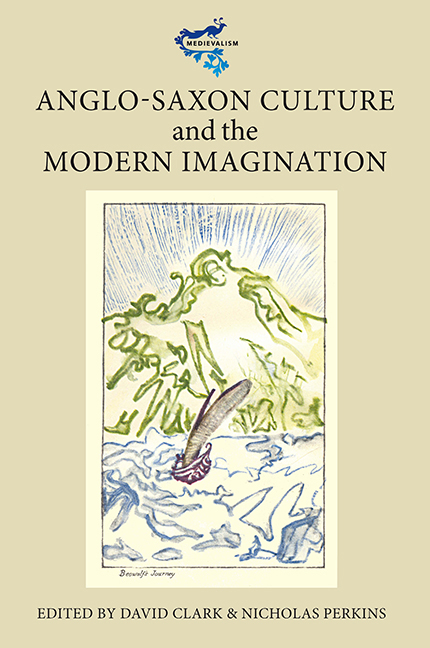Book contents
- Frontmatter
- Contents
- List of Illustrations
- Contributors
- Foreword
- Acknowledgements
- Abbreviations
- Introduction
- 1 From Heorot to Hollywood: Beowulf in its Third Millennium
- 2 Priming the Poets: The Making of Henry Sweet's Anglo-Saxon Reader
- 3 Owed to Both Sides: W.H. Auden's double debt to the literature of the North
- 4 Writing for an Anglo-Saxon Audience in the Twentieth Century: J.R.R. Tolkien's Old English Chronicles
- 5 ‘Wounded men and wounded trees’: David Jones and the Anglo-Saxon Culture Tangle
- 6 Basil Bunting, Briggflatts, Lindisfarne, and Anglo-Saxon Interlace
- 7 BOOO Seeing Beowulf in Pictures and Print
- 8 Window in the Wall: Looking for Grand Opera in John Gardner's Grendel
- 9 Re-placing Masculinity: The DC Comics Beowulf Series and its Context, 1975–6
- 10 P.D. James Reads Beowulf
- 11 Ban Welondes: Wayland Smith in Popular Culture
- 12 ‘Overlord of the M5’: The Superlative Structure of Sovereignty in Geoffrey Hill's Mercian Hymns
- 13 The Absent Anglo-Saxon Past in Ted Hughes's Elmet
- 14 Resurrecting Saxon Things: Peter Reading, ‘species decline’, and Old English Poetry
- Index
10 - P.D. James Reads Beowulf
Published online by Cambridge University Press: 20 April 2017
- Frontmatter
- Contents
- List of Illustrations
- Contributors
- Foreword
- Acknowledgements
- Abbreviations
- Introduction
- 1 From Heorot to Hollywood: Beowulf in its Third Millennium
- 2 Priming the Poets: The Making of Henry Sweet's Anglo-Saxon Reader
- 3 Owed to Both Sides: W.H. Auden's double debt to the literature of the North
- 4 Writing for an Anglo-Saxon Audience in the Twentieth Century: J.R.R. Tolkien's Old English Chronicles
- 5 ‘Wounded men and wounded trees’: David Jones and the Anglo-Saxon Culture Tangle
- 6 Basil Bunting, Briggflatts, Lindisfarne, and Anglo-Saxon Interlace
- 7 BOOO Seeing Beowulf in Pictures and Print
- 8 Window in the Wall: Looking for Grand Opera in John Gardner's Grendel
- 9 Re-placing Masculinity: The DC Comics Beowulf Series and its Context, 1975–6
- 10 P.D. James Reads Beowulf
- 11 Ban Welondes: Wayland Smith in Popular Culture
- 12 ‘Overlord of the M5’: The Superlative Structure of Sovereignty in Geoffrey Hill's Mercian Hymns
- 13 The Absent Anglo-Saxon Past in Ted Hughes's Elmet
- 14 Resurrecting Saxon Things: Peter Reading, ‘species decline’, and Old English Poetry
- Index
Summary
In perhaps the most familiar moment in early Anglo-Latin literature, Bede describes a meeting in which the Northumbrian King Edwin's chief councillors weigh the merits of the new Christian faith. One councillor famously compares ‘the present life of man on earth’ to ‘the swift flight of a single sparrow through the banqueting hall’:
In the midst there is a comforting fire to warm the hall; outside, the storms of winter rain or snow are raging. This sparrow flies swiftly in through one door of the hall, and out through another. While he is inside, he is safe from the winter storms; but after a few moments of comfort, he vanishes from sight into the wintry world from which he came. Even so, man appears on earth for a little while; but of what went before this life or what follows, we know nothing.
That Christianity offers a cosmology which illuminates the void outside the metaphorical hall, which offers light rather than darkness or winter storms after death, is of course one of the new faith's attractions, and Edwin and the Northumbrians eventually convert, largely because of this great promise. The equally familiar and elegiac account of Scyld Scefing's death in Beowulf offers, of course, a benighted obverse moment: the mourning Danes have no sense of Scyld's destination as they watch his funeral ship drift out to sea with the tide. Both texts, then, offer an epistemology of death through Christianity — explicitly in Bede and by implication in Beowulf — and the compelling possibility of a spiritual reality beyond this life.
This Christian cosmological paradigm likely owes its impressive centuries-long endurance to the comfort it provides in the cold reality of death — a reality which the crime novelist P.D. James has dwelled upon and anatomized (sometimes literally) in a literary career spanning nearly a half-century and some twenty books. While she has explored the relationship between religion and death in other novels, perhaps most memorably in A Taste for Death, in her 2001 novel Death in Holy Orders she offers a meditation on the English Christian institutional history of this relationship, going all the way back to the Anglo-Saxon Middle Ages — an historical connection she emphasizes through numerous references to Beowulf throughout the narrative.
- Type
- Chapter
- Information
- Anglo-Saxon Culture and the Modern Imagination , pp. 183 - 200Publisher: Boydell & BrewerPrint publication year: 2010



